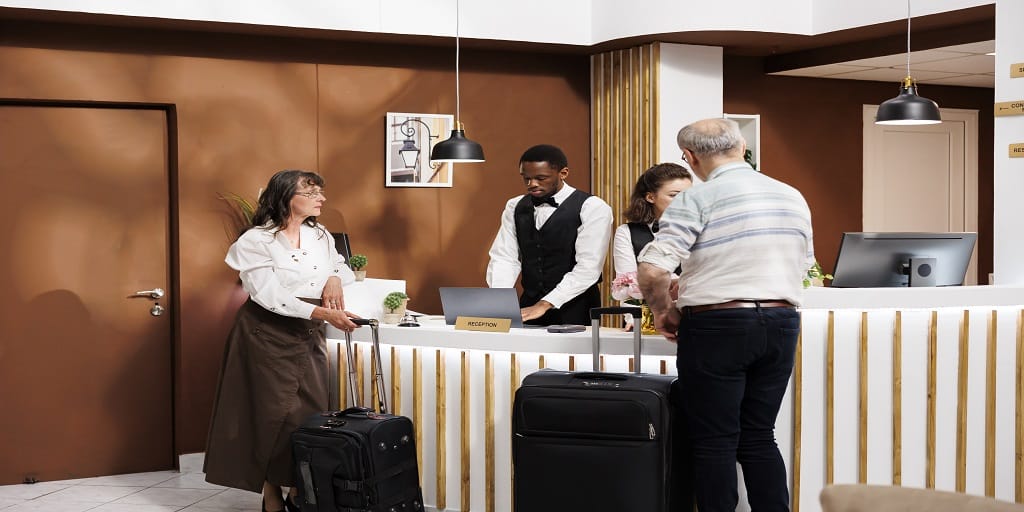The Current Landscape: Oman’s Vision for Tourism and Hospitality Growth
Why the Sultanate of Oman is a Prime Tourism Destination
Over the past decade, Oman has positioned itself as one of the GCC’s (Gulf Cooperation Council) most authentic and sustainable travel destinations. Guided by Vision 2040, the nation’s long-term economic diversification plan, tourism has become a cornerstone of national growth—driving innovation, sustainability, and global recognition.
From the tranquil beaches of Muscat to the breathtaking fjords of Musandam and the lush greenery of Salalah, Oman offers unmatched diversity in its natural and cultural heritage. These attractions, paired with the nation’s commitment to world-class hospitality, have made it a destination of choice for travelers seeking luxury, culture, and adventure.
However, as visitor volumes rise and guest expectations evolve, Omani hotels face mounting pressure to modernize. To maintain competitiveness and operational excellence, they must embrace the latest in digital transformation—particularly in the realm of cloud-based hotel solutions in Oman.
Operational Challenges Facing Traditional Hotels in Oman
Despite impressive growth, many hotels in Oman still operate on outdated legacy systems that limit performance and profitability. Traditional PMS, POS, and channel manager setups often function in silos, leading to fragmented communication and inefficiencies across departments.
For example, front desk staff may struggle to synchronize data with housekeeping, causing delays in room readiness. Revenue managers may find it difficult to track rate changes across multiple OTAs, leading to revenue leakage. Finance teams often face repetitive manual work that wastes valuable time.
Additionally, Oman’s hotels cater to a wide demographic—local travelers, GCC residents, and international tourists—each with different expectations. Without integrated guest data, delivering personalized service becomes nearly impossible.
These challenges make it increasingly evident that relying on fragmented systems is no longer sustainable in a market where experience, speed, and personalization define success.
The Urgency of Digital Transformation in the GCC Market
The Gulf region is witnessing a digital renaissance in hospitality. Neighboring countries such as the UAE and Saudi Arabia have aggressively invested in smart hotel infrastructure and automated guest experiences.
Oman, while maintaining its unique identity, must accelerate its technological transformation to remain regionally competitive. Adopting modern hotel management software in Oman not only improves internal operations but also strengthens Oman’s global positioning as a forward-thinking destination aligned with GCC innovation standards.
What Defines a Next-Generation Hotel Management System
Core Components: PMS, Channel Manager, and Booking Engine Integration
A next-generation hospitality software in Oman integrates three critical components:
- Property Management System (PMS)—the operational core, managing reservations, billing, and housekeeping.
- Channel Manager—synchronizes room availability and rates across OTAs and booking channels in real time.
- Booking Engine—drives direct reservations through the hotel’s website, reducing dependency on third-party commissions.
Together, these elements form an all-in-one platform that eliminates the need for multiple software tools. Real-time data synchronization ensures consistency across departments, preventing double bookings, pricing errors, and operational delays.
By consolidating information into a unified dashboard, Omani hotels can improve coordination, save time, and enhance guest experiences.
Cloud-Based vs. On-Premise: Why Cloud is Crucial for Scalability in Oman
Oman’s hotels are spread across diverse regions—from bustling Muscat to remote areas like Jebel Akhdar and Salalah. This geographic variety makes cloud-based systems far more practical and scalable than on-premise software.
Cloud systems eliminate the need for expensive hardware and complex maintenance. They offer remote access, allowing managers to oversee property performance from anywhere in the world. Moreover, automatic updates ensure the advanced hospitality software for Oman hotels stays secure and compliant without manual intervention.
For Omani hoteliers, cloud solutions also provide resilience during peak tourism periods, supporting real-time operations without downtime. Reduced infrastructure costs and flexibility make cloud-based hotel management systems the preferred choice for the future.
Essential Features for the Modern Omani Hotel
Modern hotels in Oman must cater to both global and regional markets. Therefore, essential features include:
- Multi-language support to serve diverse guest profiles.
- Multi-currency compatibility for seamless international transactions.
- Integration with local tax, payment, and compliance systems to align with Omani regulations.
- Mobile-first interfaces for on-the-go staff productivity.
- Comprehensive reporting tools for decision-making and financial planning.
These features ensure the system meets the operational, cultural, and financial needs unique to the Sultanate.
The Four Pillars of Transformation: Key Benefits for Omani Hoteliers
1. Elevating the Guest Experience
Seamless Contactless Check-in and Check-out Processes
Contactless technologies are redefining hospitality standards worldwide. Guests now expect fast, touch-free experiences—from digital pre-arrival registration to mobile key access. With a modern HMS (hotel management system), Omani hotels can provide quick digital payments, minimize queues, and ensure safety without compromising personal service.
Personalized Service Through Unified Guest Data Profiles (CRM)
Integrated CRM (Customer Relationship Management) systems allow hotels to record guest preferences, stay history, and feedback. This enables front desk teams to tailor greetings, amenities, and room preferences. A returning guest from Muscat might receive a personalized welcome, while a business traveler from Dubai might get an early check-in and workspace setup—enhancing loyalty and satisfaction.
2. Maximizing Revenue and Profitability
Dynamic Pricing and Advanced Revenue Management (RMS)
Artificial Intelligence (AI) and Machine Learning (ML) tools empower hotels to analyze demand patterns, competitor rates, and occupancy forecasts in real time. This allows dynamic pricing adjustments that maximize both occupancy and ADR (Average Daily Rate).
With an integrated RMS, Omani hotels can compete effectively during high-demand events like Khareef Season in Salalah or Muscat Festival, ensuring optimized revenue outcomes.
Driving Direct Bookings to Reduce OTA Commission Costs
Third-party OTA commissions can significantly erode profits. A built-in booking engine enables hotels to drive more direct traffic via their own websites. Offering special rates, local payment options, and loyalty perks encourages guests to book directly, strengthening profit margins and brand control.
3. Achieving Operational Efficiency
Streamlining Housekeeping and Maintenance Workflows
Mobile-enabled task management allows staff to update room status instantly after cleaning or maintenance. Real-time communication ensures that front desk teams always know which rooms are available, reducing turnaround times and improving guest satisfaction.
Additionally, predictive maintenance tools identify issues before they escalate — for instance, flagging air-conditioning malfunctions in advance.
Simplified Accounting and Back-Office Automation
A modern HMS automates night audits, payroll, and daily reporting. Financial data flows seamlessly between departments, ensuring accurate balance sheets and compliance with local tax standards. Managers can access revenue reports and expense summaries anytime, leading to data-backed decision-making and reduced administrative burden.
4. Data-Driven Decision Making
Real-Time Performance Dashboards and Analytics
Hotels thrive on numbers—from occupancy rates to guest satisfaction scores. Real-time dashboards centralize metrics like RevPAR, ADR, and occupancy percentage, giving managers instant insights into property health.
With analytical forecasting, hoteliers can anticipate low seasons, launch timely promotions, and optimize staffing levels. This shift from reactive to proactive decision-making is what truly sets modern hotels apart.
Implementation Strategy: Making the Switch in the Omani Context
Selecting the Right HMS Partner: Criteria for Regional Success
Choosing the right technology partner is critical. Omani hotels should look for:
- Proven regional expertise and successful case studies in MENA.
- 24/7 customer support and local presence.
- Seamless integration with Omani payment gateways and fiscal systems.
- Customizable modules to fit specific property types—from boutique hotels to large resorts.
Partnering with a local expert like Kays IT ensures cultural alignment, personalized support, and smooth software deployment.
A Phased Approach to Migration and Staff Training
Transitioning to a modern system requires careful planning. Begin with a phased migration—shifting core modules like PMS and reservations first, followed by ancillary tools like accounting or CRM.
Comprehensive staff training ensures everyone understands new workflows and maximizes efficiency from day one. Managers should establish pilot phases, collect feedback, and refine operations before full-scale rollout.
Integration with Local Financial and Payment Gateways
In Oman, integration with trusted local financial systems is non-negotiable. Hotels must ensure compatibility with Omani banks, digital payment systems, and regulatory compliance platforms such as VAT reporting tools.
This ensures accurate accounting, instant payment reconciliation, and a smoother guest checkout experience. Moreover, it aligns operations with Oman’s growing fintech ecosystem, which supports contactless and secure transactions.
Conclusion: Securing the Future of Oman’s Hospitality Sector
Modern HMS as a Competitive Advantage in the Region
Oman’s hospitality industry stands at the intersection of heritage and innovation. With a growing influx of domestic and international travelers, adopting modern hotel technology is no longer optional — it’s strategic.
An integrated hotel system in Oman empowers Omani hoteliers to optimize costs, delight guests, and make smarter business decisions. It bridges the gap between operational efficiency and guest excellence, ensuring that hotels in Oman stay competitive across the GCC region.
Frequently Asked Questions
1. What is a modern hotel management system, and why is it essential for Omani hotels?
A modern hotel management system integrates reservations, billing, housekeeping, and guest data into one centralized platform. For Omani hotels, it streamlines daily operations, enhances guest satisfaction, and boosts profitability. It also supports Oman’s tourism growth vision by enabling hotels to deliver faster, smarter, and more personalized guest experiences.
2. How does cloud-based hotel software benefit hospitality businesses in Oman?
Cloud-based hotel software allows Omani hoteliers to manage their properties from anywhere, ensuring real-time access to reservations, reports, and analytics. It reduces infrastructure costs, minimizes downtime, and simplifies updates. For properties across regions like Muscat, Salalah, or Nizwa, it ensures consistency, scalability, and seamless coordination between teams and branches.
3. What features should Omani hoteliers look for in a hotel management solution?
When selecting a hotel management system, Omani hoteliers should prioritize multi-language and multi-currency support, mobile accessibility, local tax compliance, and integration with Omani banks and payment gateways. Features like AI-powered pricing, guest CRM, and cloud dashboards ensure efficiency, adaptability, and improved decision-making across all departments.
4. How does a hotel management system improve the guest experience?
A next-generation HMS enhances guest satisfaction by offering contactless check-ins, mobile keys, and personalized service. It consolidates guest preferences and history, allowing hotels to tailor each stay. This leads to faster service, stronger loyalty, and improved reviews—critical advantages in Oman’s competitive hospitality market where experience drives repeat business.
5. Why should Omani hotels upgrade from traditional systems to digital platforms?
Traditional systems create inefficiencies, data silos, and high maintenance costs. Upgrading to a digital, integrated HMS ensures real-time visibility, automation, and data-driven management. For Omani hotels aiming to compete with GCC leaders, digital transformation is the key to sustaining profitability, operational efficiency, and long-term guest satisfaction.



